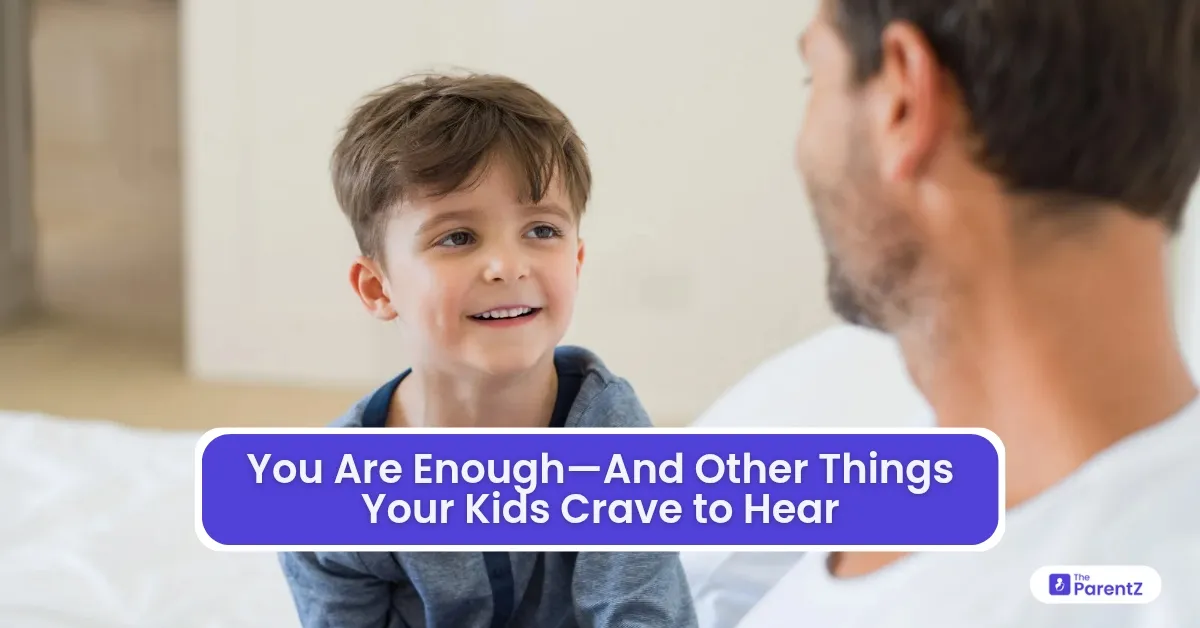Today, let's talk about the power of words. Specifically, the words our kids desperately need to hear. It's not always about the big pronouncements or grand gestures. Sometimes, it's the simple, everyday phrases that can make all the difference in a child's life.
"You Are Enough": The Foundation of Self-Worth
These are three simple words that many of us have never heard growing up. Three words that might have changed everything about how we viewed ourselves, our worth, our place in this world.
In a world that constantly tells our kids they need to be better, faster, smarter, richer, it's crucial to remind them that they are enough, just as they are. This isn't about lowering expectations; it's about fostering self-acceptance and self-love.
When kids hear "You are enough," they:
- Develop a strong sense of self-worth: They learn to value themselves for who they are, not just for what they achieve.
- Become more resilient: They're better able to bounce back from setbacks because they know their worth isn't tied to their successes.
- Take healthy risks: They're more willing to try new things because they're not afraid of failure.
- Form healthier relationships: They're less likely to seek validation from others because they already feel good about themselves.
What if they don't hear it? They may grow up constantly seeking external validation, feeling like they're never good enough, and struggling with anxiety and depression.
"I Love Spending Time With You": The Gift of Presence
In our busy lives, it's easy to get caught up in schedules and to-do lists. But our kids crave our presence, our undivided attention. Telling them, "I love spending time with you," and then actually showing it, is a powerful way to strengthen your bond.
When kids hear "I love spending time with you," they:
- Feel valued and important: They know they matter to you, not just as a child, but as a person.
- Develop a sense of belonging: They feel connected to their family and community.
- Learn positive social skills: They learn how to interact with others in a healthy and meaningful way.
- Create lasting memories: They'll cherish the moments you spend together for years to come.
What if they don't hear it? They may feel neglected, unloved, and resentful. They may seek attention in negative ways or withdraw emotionally.
"I Love Being Your Parent": The Joy of Connection
"I love being your parent." Not "I love you despite your flaws" or "I love you when you behave." Simply: I love the privilege of being your mother, your father. I would choose you again and again.
Letting your child know that you genuinely enjoy being their parent is incredibly powerful. It reinforces their sense of belonging and assures them that they bring joy to your life.
When kids hear "I love being your parent," they:
- Feel secure in your love: They know that your love isn't conditional.
- Develop a deeper connection with you: They feel closer and more connected.
- Gain confidence: They feel validated and appreciated.
What if they don't hear it? They might question their place in your life or feel like a burden.
"I See How Hard You're Working, and I'm Proud of You": Recognizing Effort, Not Just Achievement
We often focus on results: grades, scores, and awards. But it's just as important to recognize the effort our kids put in, regardless of the outcome. Praising effort fosters a growth mindset and encourages perseverance.
When kids hear "I see how hard you're working, and I'm proud of you," they:
- Develop a strong work ethic: They learn to value hard work and dedication.
- Become more motivated: They're more likely to keep trying, even when things get difficult.
- Learn to embrace challenges: They see challenges as opportunities for growth, not as threats to their self-worth.
- Develop a sense of accomplishment: They feel proud of themselves for their effort, regardless of the outcome.
What if they don't hear it? They may become discouraged, give up easily, and develop a fear of failure.
"Your Thoughts and Ideas Matter": Validating Their Voice
Kids have amazing insights, creativity, and perspectives. When we listen to their thoughts and ideas, we validate their voice and empower them to think critically and creatively.
When kids hear "Your thoughts and ideas matter," they:
- Develop confidence in their own abilities: They believe they have something valuable to contribute.
- Become more creative and innovative: They're more willing to explore new ideas and take risks.
- Learn to express themselves effectively: They develop strong communication skills.
- Become more engaged in their learning: They take ownership of their education and become lifelong learners.
What if they don't hear it? They may become passive, withdrawn, and hesitant to share their thoughts and ideas. They may feel like their voice doesn't matter.
"You Are Stronger Than You Think": Encouraging Resilience
Life can be tough, and kids often face challenges that feel overwhelming. Reminding them that they are stronger than they think can help them tap into their inner reserves of strength and resilience.
When kids hear "You are stronger than you think," they:
- Develop self-confidence: They believe in their ability to overcome obstacles.
- Become more resilient: They're better able to bounce back from setbacks.
- Learn to face their fears: They're more willing to step outside their comfort zone.
What if they don't hear it? They may feel helpless, give up easily, and struggle to cope with adversity.
"It's Okay to Make Mistakes. Mistakes Help Us Grow": Embracing Imperfection
Mistakes are a natural part of life, and they're essential for learning and growth. When we teach our kids that it's okay to make mistakes, we help them develop resilience and a growth mindset.
When kids hear "It's okay to make mistakes. Mistakes help us grow," they:
- Become less afraid of failure: They see mistakes as opportunities for learning, not as signs of inadequacy.
- Take more risks: They're more willing to try new things because they're not afraid of making mistakes.
- Develop problem-solving skills: They learn how to analyze their mistakes and find solutions.
- Become more resilient: They're better able to bounce back from setbacks because they know mistakes are part of the process.
What if they don't hear it? They may develop a fear of failure, avoid challenges, and become perfectionists, leading to anxiety and stress.
"You Don't Have to Be the Best, Just Do Your Best": Releasing the Pressure
In a competitive world, it's easy for kids to feel pressured to be the best. Reminding them that all you ask is that they do their best can help relieve that pressure and allow them to focus on growth and effort.
When kids hear "You don't have to be the best, just do your best," they:
- Reduce anxiety and stress: They're less worried about comparing themselves to others.
- Focus on personal growth: They're more interested in improving their own skills and abilities.
- Develop a healthy sense of competition: They learn to compete with themselves, not with others.
What if they don't hear it? They may become perfectionists, experience anxiety, and struggle with self-esteem.
The Raw Truth About Parental Wounds
Let's be brutally honest: Many of us struggle to give these affirmations because we never received them ourselves. We're trying to pour from empty cups, speaking words that feel foreign on our tongues.
"I catch myself sounding exactly like my mother. Those dismissive tones, the eye rolls, the focus on what needs improvement rather than what's going well. I'm passing down the same wounds without meaning to."
This is the uncomfortable truth of parenting: We must heal ourselves to avoid transferring our wounds. We must learn to speak a language of affirmation that might sound like a foreign dialect to our ears.
Conclusion
The beautiful possibility here is that we can break generational patterns. We can be the parents who say what we needed to hear:
"You don't have to earn my love."
"Your emotions are valid, even the messy ones."
"I see your effort, not just your results."
"You matter to me, exactly as you are."
These aren't empty compliments or participation trophies. They're truths that anchor children in their inherent worth.
So, start today. Find your child. Look them in the eyes. And tell them what your heart might have needed to hear: "You, exactly as you are right now, are enough."






Be the first one to comment on this story.